External links
- Official website
- First Diatribe Article
- Second Diatribe Article
| Pontos | |
|---|---|
| Directed by | Peter Stefanidis |
| Written by | Peter Stefanidis |
| Produced by | Peter Stefanidis, Ria Stefanidis |
| Starring | Lee Mason, Ross Black, Michele Cele, Tara Jade Ross, David Stavretis |
| Cinematography | Peter Andrian |
| Edited by | Peter Stefanidis |
| Music by | Paul Housman |
Release date |
|
Running time | 10 minutes |
| Country | Australia |
| Language | English |
| Budget | $5,000 |
Pontos is a 2008 dramatic short film concerning the Greek genocide. The film's duration is a little over 10 minutes and was filmed entirely in Australia. Written, produced and directed by Peter Stefanidis, Pontos aims to capture a small part of the genocide from the perspective of its two central characters played by Lee Mason (Kemal) and Ross Black (Pantzo). In 2008, Pontos was screened at the short film corner at the Festival De Cannes film festival to critical acclaim on 19 May (a day of remembrance for Pontic Greeks).
The film begins with an unknown figure looking through old photographs of the genocide. Then there is a flashback and we see the protagonist of the film, Pantzo (Ross Black) Pontian partisan, cleaning a bloodied knife with the bodies of Turkish soldiers at his feet. Kemal (Lee Mason) is dragged to Pantzo awaiting execution. Kemal's family is forced to watch. There is another flashback to an earlier time revealing a captured Pantzo forced to watch the brutal murder of his wife and daughter by the same Turkish soldiers now dead.
Flashing forward to Kemal's capture, Kemal antagonizes Pantzo to carry out the execution. Pantzo plunges the knife into the ground leaving a stunned Kemal to ponder why his life was spared.

The Greco-Turkish War of 1919–1922 was fought between Greece and the Turkish National Movement during the partitioning of the Ottoman Empire in the aftermath of World War I, between May 1919 and October 1922.

The Turkish War of Independence was a series of military campaigns waged by the Turkish National Movement after parts of the Ottoman Empire were occupied and partitioned following its defeat in World War I. These campaigns were directed against Greece in the west, Armenia in the east, France in the south, loyalists and separatists in various cities, and British and Ottoman troops around Constantinople (İstanbul).

The Srebrenica massacre, also known as the Srebrenica genocide, was the July 1995 genocidal killing of more than 8,000 Bosniak Muslim men and boys in and around the town of Srebrenica, during the Bosnian War.
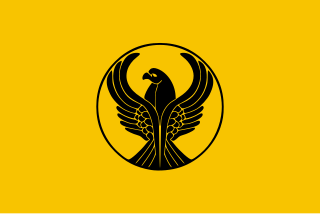
The Pontic Greeks, also Pontian Greeks or simply Pontians, are an ethnically Greek group indigenous to the region of Pontus, in northeastern Anatolia. Many later migrated to other parts of Eastern Anatolia, to the former Russian province of Kars Oblast in the Transcaucasus, and to Georgia in various waves between the Ottoman conquest of the Empire of Trebizond in 1461 and the Russo-Turkish War of 1828–1829. Those from southern Russia, Ukraine, and Crimea are often referred to as "Northern Pontic [Greeks]", in contrast to those from "South Pontus", which strictly speaking is Pontus proper. Those from Georgia, northeastern Anatolia, and the former Russian Caucasus are in contemporary Greek academic circles often referred to as "Eastern Pontic [Greeks]" or as Caucasian Greeks, but also include the Turkic-speaking Urums.

The Greek genocide, which included the Pontic genocide, was the systematic killing of the Christian Ottoman Greek population of Anatolia which was carried out mainly during World War I and its aftermath (1914–1922) on the basis of their religion and ethnicity. It was perpetrated by the government of the Ottoman Empire led by the Three Pashas and by the Government of the Grand National Assembly led by Mustafa Kemal Atatürk, against the indigenous Greek population of the Empire. The genocide included massacres, forced deportations involving death marches through the Syrian Desert, expulsions, summary executions, and the destruction of Eastern Orthodox cultural, historical, and religious monuments. Several hundred thousand Ottoman Greeks died during this period. Most of the refugees and survivors fled to Greece. Some, especially those in Eastern provinces, took refuge in the neighbouring Russian Empire.

Chrysostomos Kalafatis known as Saint Chrysostomos of Smyrna, Chrysostomos of Smyrna and Metropolitan Chrysostom, was the Greek Orthodox metropolitan bishop of Smyrna (Izmir) between 1910 and 1914, and again from 1919 until his death in 1922. He was born in Triglia, Turkey in 1867, considerably aided the Greek campaign in Smyrna in 1919 and was subsequently killed by a lynch mob after Turkish troops took back the city at the end of the Greco-Turkish War of 1919–1922. He was declared a martyr and a saint of the Eastern Orthodox Church by the Holy Synod of the Church of Greece on 4 November 1992.

The burning of Smyrna destroyed much of the port city of Smyrna in September 1922. Eyewitness reports state that the fire began on 13 September 1922 and lasted until it was largely extinguished on 22 September. It began four days after the Turkish military captured the city on 9 September, effectively ending the Greco-Turkish War, more than three years after the landing of Greek army troops at Smyrna on 15 May 1919. Estimated Greek and Armenian deaths resulting from the fire range from 10,000 to 125,000.

Şebinkarahisar is a town in and the administrative seat for Şebinkarahisar District, Giresun Province in the Black Sea region of northeastern Turkey.

The Greeks in Turkey constitute a small population of Greek and Greek-speaking Eastern Orthodox Christians who mostly live in Istanbul, as well as on the two islands of the western entrance to the Dardanelles: Imbros and Tenedos.
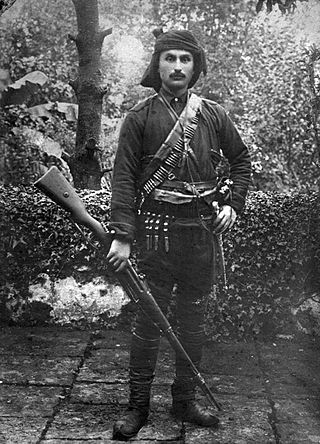
Hacı Topal Osman Ağa was a Turkish officer, a militia leader of the National Forces, a volunteer regiment commander of the Turkish army during the Turkish War of Independence who eventually rose to the rank of lieutenant colonel, and was a perpetrator of the Armenian and Pontic genocides.
Lee Mason is an Australian film, television and stage actor from Melbourne. He is probably best known for his lead role in The Independent as naive independent politician Marty Browning. This role garnered Mason many favourable reviews, with James Brown of FilmInk describing Marty as "the most charming protagonist since Kenny". Recently awarded Best Actor in two major Film Festivals in 2016, Lee Mason has proved a unique character actor capable of lead roles and also memorable cameos. He has worked steadily in the Australian film industry for the last 10 years. He has worked as a director, writer and producer. He is perhaps best known for his portrayal of Marty Browning in The Independent and more recently Raskolnikov in Crime and Punishment. Mason's most recent work is a production of Glengarry Glen Ross at the Chapel Off Chapel theatre in Prahran.
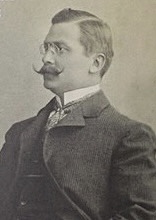
Ali Kemal Bey was a Turkish journalist, newspaper editor, poet, liberal-leaning politician, and government official who was for some three months Minister of the Interior in the government of Damat Ferid Pasha, the Grand Vizier of the Ottoman Empire. He was murdered by paramilitary officers during the Turkish War of Independence.

Refet Bele, also known as Refet Bey or Refet Pasha was a Turkish military commander. He served in the Ottoman Army and the Turkish Army, where he retired as a general.

The Greek Summer Offensive of 1920 was an offensive by the Greek army, assisted by British forces, to capture the southern region of the Sea of Marmara and the Aegean Region from the Kuva-yi Milliye of the provisional Turkish national movement government in Ankara. Additionally, the Greek and British forces were supported by the Kuva-yi Inzibatiye of the Ottoman government in Constantinople, which sought to crush the Turkish nationalist forces. The offensive was part of the Greco-Turkish War and was one of several engagements where British troops assisted the advancing Greek army. British troops actively took part in invading coastal towns of the Sea of Marmara. With the approval of the Allies, the Greeks started their offensive on 22 June 1920 and crossed the 'Milne Line'. The 'Milne Line' was the demarcation line between Greece and Turkey, laid down in Paris. Resistance by the Turkish nationalists was limited, as they had few and ill-equipped troops in western Anatolia. They were also busy on the eastern and southern fronts. After offering some opposition, they retreated to Eskişehir on Mustafa Kemal Pasha's order.

Matthaios Kofidis was an Ottoman Greek businessman, historian and a politician, who was a member of the Ottoman Parliament. He was elected in three successive periods from 1908 to 1918. In 1921 he was among the notables of the Greek community of the Pontus region who were hanged by the Turkish nationalists of Mustafa Kemal.
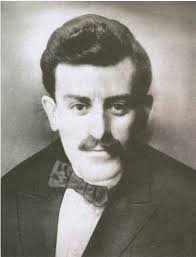
Nikos Kapetanidis was a Greek journalist and newspaper publisher. He was one of the notable Pontians hanged by Turkish nationalists serving under Mustafa Kemal.

The Amasya trials in 1921, were special ad hoc trials, organized by the Turkish National Movement, with the purpose to kill en masse the Greek representatives of Pontus region under a legal pretext. They occurred in Amasya, modern Turkey, during the final stage of the Pontic Greek genocide. The total number of the executed individuals is estimated to be ca. 400-450, among them 155 prominent Pontic Greeks.
Pontus or Pontos may refer to:
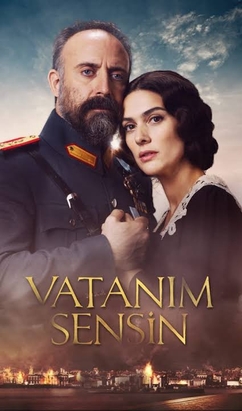
Vatanım Sensin is a Turkish television drama set during the last years of Ottoman Empire and the Turkish War of Independence. The main character "Cevdet" is based on the life of Mustafa Mümin Aksoy, whose nickname was "Gavur Mümin". The first episode aired on October 26, 2016 on Kanal D. It stars Halit Ergenç and Bergüzar Korel.
The question of who was responsible for starting the burning of Smyrna continues to be debated, with Turkish sources mostly attributing responsibility to Greeks or Armenians, and vice versa. Other sources, on the other hand, suggest that at the very least, Turkish inactivity played a significant part on the event.